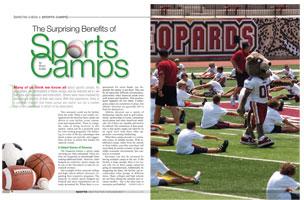
 Many of us think we know all about sports camps. As youngsters, we participated in these camps, and as maturity set in, we had jobs as counselors and instructors. Others were more involved by becoming a director of their own camp. With this experience, there is a common thought that these camps are useful, but not a market that is very beneficial in which to be associated.
Many of us think we know all about sports camps. As youngsters, we participated in these camps, and as maturity set in, we had jobs as counselors and instructors. Others were more involved by becoming a director of their own camp. With this experience, there is a common thought that these camps are useful, but not a market that is very beneficial in which to be associated.
This rationale could not be further from the truth. What is not widely recognized are the benefits these camps can deliver to your facility, event, tournament and organization. There is a tangible value to being involved in this market, which can be a powerful asset for your existing programs. The following are some of the key advantages that sports camps can provide, and suggestions on how to utilize this market for superior results.
A Valued Source of Revenue
The financial returns a sports camp can bring are often substantial. These entities are frequently an afterthought when seeking additional funds. However, when budgets are restrictive, sports camps can be one of the first places to look for increased revenues.
One example of this concerns college and high school athletic directors, regarding their respective programs. The majority of school sports budgets are limited, and most expenditures are already accounted for. When there is a requirement for extra funds, too frequently the money is not there. This can be an especially difficult circumstance, particularly when financial needs arise with teams and facilities. This predicament happens all too often. Contingency plans are sometimes in place, but athletic directors are generally left to fend for themselves.
Athletic directors use a variety of fund raising vehicles such as golf tournaments, sponsorship of events, community involvement and other beneficial methods. All of these are valuable and need to be utilized. My contention, if done properly, is that sports camps can often be on an equal level with these other approaches concerning fund raising.
What these camps provide is a consistent source of reliable income. With established camps, either from the outside or from within, year after year there will most likely be positive returns. In this unstable economic environment, this cannot be overstated.
Revenues can also be increased by having multiple camps at the site. If the facility is large enough, there is no reason why two or three camps cannot be going on simultaneously. Additionally, by staggering the dates, the facility can accommodate other groups at different times. Many colleges and high schools are not busy during the summer and vacation months - this is the ideal time to maximize profitability!
 Before deals are cemented and contracts are signed, facility directors need to realize what would be fair to all parties with concern to the financial arrangements. The goal here is to have longstanding relationship thus ensuring the camps are able to make a reasonable profit as well.
Before deals are cemented and contracts are signed, facility directors need to realize what would be fair to all parties with concern to the financial arrangements. The goal here is to have longstanding relationship thus ensuring the camps are able to make a reasonable profit as well.
When I owned a camp, a member of another college athletic department asked me to run another camp at their site. I visited the school grounds and was given first class treatment - it was very clear they wanted my business. The subject of cost was avoided every time I broached the topic.
When I finally received their financial proposal, I was completely surprised. The arrangement was so one-sided (in the school's favor) that I would earn only a small profit. Plus, there was very little negotiating room in the proposal. I politely declined the offer, and wondered how a facility could expect to attract a top camp if there was no room for both parties to profit.
The lesson here is: It is good business to be fair. There are several types of financial arrangements when constructing a deal, and even though the facility usually has the upper hand in negotiations, it should never be one sided.
The Flexibility Factor
There are so many different classifications of sports camps throughout the United States - they can range from being sports-specific to the multi-sports genre. Besides camps for children, adult camps are gaining increased popularity. And there are day and residential types within this category.
Event organizers and directors of sports programs have, at their disposal, an unlimited variety of options. Almost all sports facilities have the ability to host camps. Whether it is outdoor fields, swimming pools, tracks, or tennis courts - a camp can be created.
The adaptable nature of this market is also exemplified in the various time periods of sessions. They can be held anytime from one to eight weeks, and fit in with the schedule of your facility (or tournament season). Weekends are also a great time to have adult camps. The winter months and vacations are additionally ideal dates. A camp can be arranged for a period of time to fit with the complex's situation. The point is that this market is adaptable to what you presently do. How many other businesses can you say that about?
New Clientele for Existing Programs
Participants in camps will often join in other activities offered by the location where their camp is housed. Friends and relatives might, in many instances, become involved too. Once these campers are on your grounds, they will view the other facilities of the sports complex or building.The location should actively promote all events scheduled. Rarely is there as captive an audience as this setting can provide.
An example of this is a tennis club that charges a membership fee and also hosts various tournaments throughout the year. If there is a particular event such as a large junior tennis tournament on a certain date, the camp and club should both publicize the occasion. This will serve two benefits. First, it will help with the success of the upcoming tournament. Second, campers and their friends will have the opportunity to become members of the club. Promotional materials should also be distributed to the campers concerning tournament dates and club-scheduled activities.
 When I owned my camp, I made it a point to actively inform people of other activities offered at the facility. If there were special events at the place, I informed everyone. The organizers of the events appreciated this and it strengthened our relationship.
When I owned my camp, I made it a point to actively inform people of other activities offered at the facility. If there were special events at the place, I informed everyone. The organizers of the events appreciated this and it strengthened our relationship.
Many of the same individuals who run these events will include a specific camp in their promotional materials, and vice versa. They realize by working with these camps and promoting each others' products, everybody wins.
Enhanced Reputation
By having a successful,well-run camp at your locale, you will be able to draw people in from different geographic areas. Plus, the stature of your event or complex will be elevated. A sports complex is representative of an entity that attracts people from the local and surrounding regions. If the camps on these premises are known as solid, trustworthy businesses, it will only help the standing of the facility.
A good reputation goes a long way, and you would want to be known as the place that has great camps at your location. If this is the case, the geographic span of potential members will increase, and others will be clamoring to be involved with these camps. Parents will often have no qualms about driving that extra distance if it means their child will go to the desired camp. Anytime the stature of one of your programs increases, everyone associated with the business is helped.
With the solid reputation great camps can engender, the outside community will take notice, and the support for your services will grow. Local business members may wish to get involved with an organization that is held in high regard, resulting in sponsorship opportunities and the goodwill of the community at large.
In my personal experience and observations, I have found it interesting that camps in high repute can have very important backers. Repeatedly, one finds that some of the parents of campers have high positions in the community, and thereby have significant influence. These individuals will not only be stark supporters of the camp, but will also be advocates of the facility which houses the camp. With adult camps, this can also be the case. Parents and friends who are involved with the camps often are in good financial and personal standing. Prominent members of the community who recommend your camps are an excellent source of referrals and support.
Complementary Tie-In with Tournament and Event Organizers
A natural fit for camps are actual sports events. If camps are held prior to the events themselves, attendance will be greater on both sides of the equation. Many of these campers might even be participants in these contests. Additionally, events and camps are sometimes one and the same, with this combination being a unique, but profitable niche.
Another hand-in-glove relationship is that between camps and the senior market. More than ever, seniors are realizing the health benefits of recreational activity. Communities across the country are taking notice of this ongoing trend. Cities and other locales are availing their fields and facilities to this group. With this popularity, more and more events are being held just for this segment.
One sport which has achieved a certain acclaim is senior softball. There are senior softball associations in many of the states across the country. Men and women players in their 60s, 70s, and beyond take this sport seriously and yet have a great deal of fun. With this renown,events have arisen in many different venues.
There is one special group that looks upon itself as a camp and an event in the same package. This is a winter senior softball camp which is entering its 18th year in February. The camp advertises itself as a fun event for all skill levels at a beautiful sports complex in Altamonte Springs, Florida. Most of the campers are over 70, and they return every year. These gentlemen hail from all over the country, and during their week's stay, the gathering takes on many of the characteristics of an event, with activities planned during both the day and evening hours.
Sports Camps' Valuable Roles
As shown above, sports camps play a valuable role for event organizers, or individuals, who run and organize sports programs. With today's economic uncertainty, there is even more reason to maximize the worth of this group. Camps even provide additional jobs to help with the area's employment situation.
On the flip side, camp organizations also realize their responsibility to hire local employees for their camps. U.S. Sports Camps, which are the licensed operators of the Nike Camps, will have a partnership arrangement with a particular facility, and staffing is the responsibility of the local director. With over 400 camps in their organization, they realize the value of supporting the surrounding community.
For those of you already involved with camps, hopefully the above will help you maximize efficiency. With others, there is still time to get started for the summer season.
Either way, there are positive business relationships to be formed for years to come.

